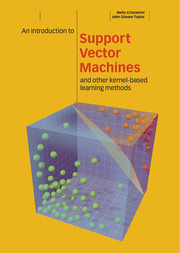Book contents
- Frontmatter
- Contents
- Preface
- Notation
- 1 The Learning Methodology
- 2 Linear Learning Machines
- 3 Kernel-Induced Feature Spaces
- 4 Generalisation Theory
- 5 Optimisation Theory
- 6 Support Vector Machines
- 7 Implementation Techniques
- 8 Applications of Support Vector Machines
- A Pseudocode for the SMO Algorithm
- B Background Mathematics
- References
- Index
1 - The Learning Methodology
Published online by Cambridge University Press: 05 March 2013
- Frontmatter
- Contents
- Preface
- Notation
- 1 The Learning Methodology
- 2 Linear Learning Machines
- 3 Kernel-Induced Feature Spaces
- 4 Generalisation Theory
- 5 Optimisation Theory
- 6 Support Vector Machines
- 7 Implementation Techniques
- 8 Applications of Support Vector Machines
- A Pseudocode for the SMO Algorithm
- B Background Mathematics
- References
- Index
Summary
The construction of machines capable of learning from experience has for a long time been the object of both philosophical and technical debate. The technical aspect of the debate has received an enormous impetus from the advent of electronic computers. They have demonstrated that machines can display a significant level of learning ability, though the boundaries of this ability are far from being clearly defined.
The availability of reliable learning systems is of strategic importance, as there are many tasks that cannot be solved by classical programming techniques, since no mathematical model of the problem is available. So for example it is not known how to write a computer program to perform hand-written character recognition, though there are plenty of examples available. It is therefore natural to ask if a computer could be trained to recognise the letter ‘A’ from examples – after all this is the way humans learn to read. We will refer to this approach to problem solving as the learning methodology
The same reasoning applies to the problem of finding genes in a DNA sequence, filtering email, detecting or recognising objects in machine vision, and so on. Solving each of these problems has the potential to revolutionise some aspect of our life, and for each of them machine learning algorithms could provide the key to its solution.
In this chapter we will introduce the important components of the learning methodology, give an overview of the different kinds of learning and discuss why this approach has such a strategic importance. After the framework of the learning methodology has been introduced, the chapter ends with a roadmap for the rest of the book, anticipating the key themes, and indicating why Support Vector Machines meet many of the challenges confronting machine learning systems. As this roadmap will descibe the role of the different chapters, we urge our readers to refer to it before delving further into the book.
Information
- Type
- Chapter
- Information
- Publisher: Cambridge University PressPrint publication year: 2000
Accessibility standard: Unknown
Why this information is here
This section outlines the accessibility features of this content - including support for screen readers, full keyboard navigation and high-contrast display options. This may not be relevant for you.Accessibility Information
- 6
- Cited by
